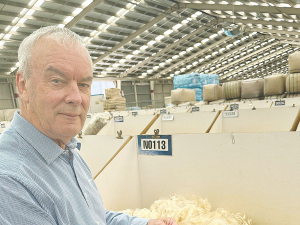Editorial: United strategy for wool
OPINION: Wool farmers believe the future of strong wool still holds promise.
 Allan Jones inspecting wool that is up for auction at the PGG Wrightson Napier Woolstore. Photo Credit: PGG Wrightson.
Allan Jones inspecting wool that is up for auction at the PGG Wrightson Napier Woolstore. Photo Credit: PGG Wrightson.
PGG Wrightson North Island wool manager Allan Jones has classed his last fleece after 57 years in the industry.
Growing up on his family's Timaru lifestyle property and regularly working on nearby farms, Jones wanted to go into shepherding or farming. This was until a careers teacher noticed his flair for wool, which led to an interview that took him straight from school to Dalgety's in Timaru as a trainee wool classer in 1966.
After three years learning the trade, Jones moved to the Dalgety Whanganui bin room where he spent the next 12 years, continuing his education through Lincoln's wool course in 1971/72.
"After classing through the season in winter we visited farmers and growers; were there any changes in their shearing patterns, how had the clip performed the previous season?" he explains. "Wool reps didn't come in until the late 70s. What we did then turned into what that job is now."
In 1981, Jones became assistant manager at the Dalgety wool centre in Napier. In 1982, Dalgety and Hawke's Bay Farmers merged with Jones becoming the company's new operations manager in a series of mergers throughout the 80s and 90s that eventually created PGG Wrightson.
"Sheep numbers were down and plenty of change was happening. Each merger meant a double up in staff," he says.
"Through that time, with the mergers, ended up with a whole lot of woolstores. Somehow I always managed to come out with a really good job with extra responsibility.”
Throughout the years, Jones was part of several industry developments, including negotiating the first merino contract between Dalgety and Glengyle. He recalls how after negotiating for thousands of ewes and hoggets to ship to the North Island the Cook Strait ferries went on strike, stranding the stock in the South Island.
“We had to negotiate with the South Island farmers who had sold them to take them back and hold them. Meanwhile, the North Island farmers wanted them on farm and in the condition they had paid good money for,” he says.
“We were back and forth with the farmers on both sides trying to arrange transport. Eventually the ferries went back... some of the big farms ended up with 4500 to 5000 merinos, so it was big stock numbers.”
In the 2000s, Jones was heavily involved in the company’s attempt to float Wool Partners Co-operative as a new consolidated marketing entity.
Despite raising over $40M, the effort did not succeed, which he partially attributes to lingering concerns about the previous Wool Board monopoly.
Adaptation The Key
Jones says that in his 57 years of experience, adapting to change is key to success.
“I was involved at the grassroots of [sample selling] and everyone was against it: ‘We’ve done it like this for the last 50 years, why is changing that going to work?’,” he explains. “Other changes have come along frequently since. You have to adapt. Of course, some things you don’t like but if you don’t do it, you get thrown out with the bathwater.”
A similar theme runs through his thoughts on the future for wool.
“Collaboration is the way forward. We had 70 million sheep; we now have 25 million and dropping,” Jones adds. “Where we once had eight selling centres, we are now down to a few exporters, brokers and private merchants. Everybody is fighting over a dwindling clip.”
He believes if there isn’t change in the next few years, wool will just be a commodity.
“You won’t have the quantity or quality of stylish wool to meet requirements of overseas customers. Unless growers can see a future, the industry will continue to struggle.”
Additional reductions to costs for forest owners in the Emissions Trading Scheme Registry (ETS) have been announced by the Government.
Animal welfare is of paramount importance to New Zealand's dairy industry, with consumers increasingly interested in how food is produced, not just the quality of the final product.
Agriculture and Forestry Minister Todd McClay is encouraging farmers and growers to stay up to date with weather warnings and seek support should they need it.
The closure of SH2 Waioweka Gorge could result in significant delays and additional costs for freight customers around the Upper North Island, says Transporting New Zealand.
OPINION: The year has started positively for New Zealand dairy farmers and things are likely to get better.
Ministry for Primary Industries (MPI) Director General Ray Smith believes there is potential for an increase in dairy farming in New Zealand.

OPINION: If the hand-wringing, cravat and bow-tie wearing commentariat of a left-leaning persuasion had any influence on global markets, we'd…
OPINION: With Winston Peters playing politics with the PM's Indian FTA, all eyes will be on Labour who have the…